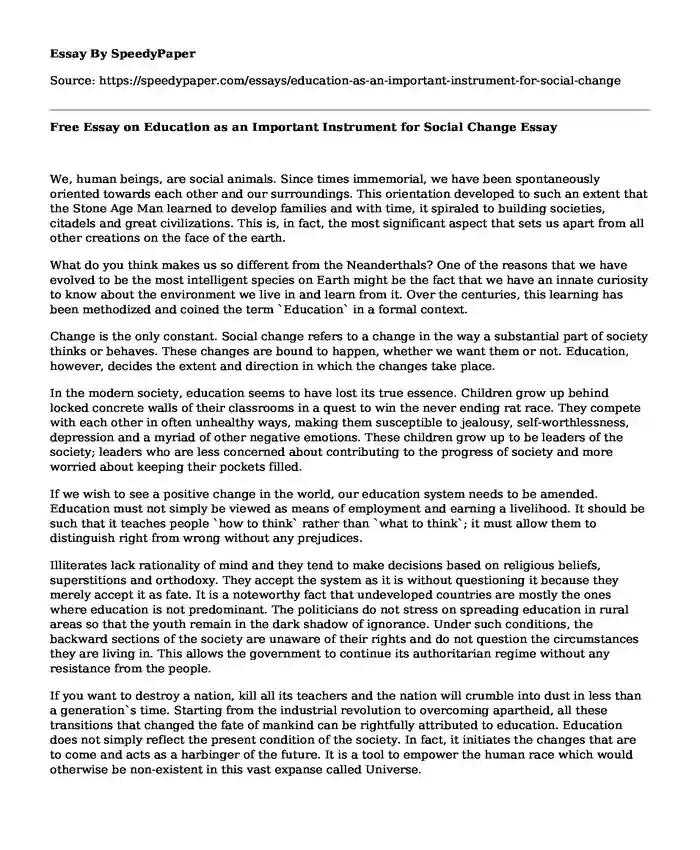
| Type of paper: | Essay |
| Categories: | Education Society Social change |
| Pages: | 2 |
| Wordcount: | 538 words |
We, human beings, are social animals. Since times immemorial, we have been spontaneously oriented towards each other and our surroundings. This orientation developed to such an extent that the Stone Age Man learned to develop families and with time, it spiraled to building societies, citadels and great civilizations. This is, in fact, the most significant aspect that sets us apart from all other creations on the face of the earth.
What do you think makes us so different from the Neanderthals? One of the reasons that we have evolved to be the most intelligent species on Earth might be the fact that we have an innate curiosity to know about the environment we live in and learn from it. Over the centuries, this learning has been methodized and coined the term `Education` in a formal context.
Change is the only constant. Social change refers to a change in the way a substantial part of society thinks or behaves. These changes are bound to happen, whether we want them or not. Education, however, decides the extent and direction in which the changes take place.
In the modern society, education seems to have lost its true essence. Children grow up behind locked concrete walls of their classrooms in a quest to win the never ending rat race. They compete with each other in often unhealthy ways, making them susceptible to jealousy, self-worthlessness, depression and a myriad of other negative emotions. These children grow up to be leaders of the society; leaders who are less concerned about contributing to the progress of society and more worried about keeping their pockets filled.
If we wish to see a positive change in the world, our education system needs to be amended. Education must not simply be viewed as means of employment and earning a livelihood. It should be such that it teaches people `how to think` rather than `what to think`; it must allow them to distinguish right from wrong without any prejudices.
Illiterates lack rationality of mind and they tend to make decisions based on religious beliefs, superstitions and orthodoxy. They accept the system as it is without questioning it because they merely accept it as fate. It is a noteworthy fact that undeveloped countries are mostly the ones where education is not predominant. The politicians do not stress on spreading education in rural areas so that the youth remain in the dark shadow of ignorance. Under such conditions, the backward sections of the society are unaware of their rights and do not question the circumstances they are living in. This allows the government to continue its authoritarian regime without any resistance from the people.
If you want to destroy a nation, kill all its teachers and the nation will crumble into dust in less than a generation`s time. Starting from the industrial revolution to overcoming apartheid, all these transitions that changed the fate of mankind can be rightfully attributed to education. Education does not simply reflect the present condition of the society. In fact, it initiates the changes that are to come and acts as a harbinger of the future. It is a tool to empower the human race which would otherwise be non-existent in this vast expanse called Universe.
Cite this page
Free Essay on Education as an Important Instrument for Social Change. (2017, Jul 16). Retrieved from https://speedypaper.com/essays/education-as-an-important-instrument-for-social-change
Request Removal
If you are the original author of this essay and no longer wish to have it published on the SpeedyPaper website, please click below to request its removal:
- Essay Example on The Da Vinci Code Movie and Dogma
- Free Paper with a Literature Review on the Concept of Dehumanization
- Management Essay Sample: The Importance of Organization
- Free Essay: Importance of a College Education to Succeed in Today's Society
- Essay Sample on History of Florida
- Free Essay on People's Culture for Everyone
- The US Trade Deficit Essay Sample
Popular categories




